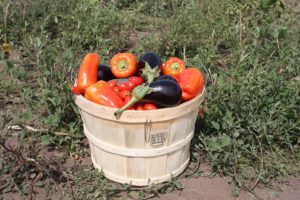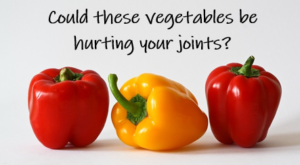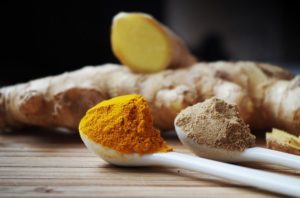 Maybe you have heard someone say…
Maybe you have heard someone say…
“I can’t eat nightshades because they make my joint pain flare up…or they give me heartburn.” We want to shed some light on this group of veggies and also provide some alternatives for anyone who may have a sensitivity.
What are “nightshade” vegetables?
 Nightshades are a family of flowering plants called Solanaceae. Some say the term “nightshade” comes from their preference to grow in shady areas and flower at nighttime.
Nightshades are a family of flowering plants called Solanaceae. Some say the term “nightshade” comes from their preference to grow in shady areas and flower at nighttime.
Certain species of nightshades are toxic to humans, while others are consumed regularly. Some of the more common foods in the nightshade family include white potatoes, tomatoes, eggplant and bell peppers, as well as the spices cayenne pepper and paprika.
These veggies include chemical compounds known as alkaloids, including solanine, nicotine and capsaicin. One of these alkaloids (solanine) acts as a defense mechanism to protect the plants against natural threats like insects. Solanine can be toxic in high concentrations, but the trace amounts in our veggies are typically safe. (When it comes to potatoes, it’s important to know…you should avoid the leafy stalks of potatoes as well as green potatoes, as those can be toxic.)
Why do some people try to avoid nightshades?
Keep in mind, these veggies are loaded with beneficial nutrients!
- Potatoes contain more potassium than a banana, half of your Vitamin C needs, plus fiber.
- Tomatoes are rich in antioxidants (especially lycopene) and high in potassium.
- Eggplant is a great source of fiber, potassium, magnesium and antioxidants.
- Bell peppers are loaded with Vitamins A & C.
Studies have even shown that patients with Parkinson’s disease are greatly aided by the natural nicotine in these foods, and capsaicin is notable for relieving pain.
So, are you thinking, if these veggies are so nutritious and beneficial, why would anyone want to avoid them?!
Some people say one or more of the nightshades cause reactions that may include increased joint pain, digestive issues, heartburn, skin reactions or other inflammatory responses. It’s thought that some people lack the necessary enzymes to properly digest the compounds in nightshade vegetables, which is what creates inflammation. While research doesn’t show a direct effect on pain or inflammation and most people don’t have any issues, we all know that everyone reacts uniquely to different foods (other examples including wheat and dairy).
As discussed in our coaching tip last week, it’s thought that some people with arthritis may suffer from an allergy or intolerance to alkaloids. Therefore, many with arthritis say avoiding nightshade vegetables helps them feel better.
How do I know if I should avoid them?
It can require some trial-and-error to determine if you have a sensitivity to these veggies. Last week, we discussed that easing inflammation is the name of the game when it comes to arthritis.
This means loading up on leafy greens, a wide variety of veggies, omega-3s, nuts, olive oil and spices like ginger and turmeric. At the same time, eliminating or limiting refined sugars, fried foods, highly processed foods and processed meats is extremely beneficial.
If you have done all these things and are still having issues, you can try removing nightshade veggies for 30 days to see how you react. If doing this helps you feel better, you can consider adding them back one at a time to identify exactly which one might be triggering the reaction.
If you do have a sensitivity, the good news is that you can still eat very nutritiously by swapping in other REAL foods that are similar in taste, texture and versatility.
Here are some substitution ideas:
 White potatoes? Substitute sweet potatoes, cauliflower, carrots, turnips or parsnips. Try these recipe ideas: Creamy Mashed Cauliflower, Cauliflower and Sweet Potato Mash, Parsnip Fries, Popcorn Roasted Cauliflower, Jicama Fries, and Grilled Sweet Potato Wedges.
White potatoes? Substitute sweet potatoes, cauliflower, carrots, turnips or parsnips. Try these recipe ideas: Creamy Mashed Cauliflower, Cauliflower and Sweet Potato Mash, Parsnip Fries, Popcorn Roasted Cauliflower, Jicama Fries, and Grilled Sweet Potato Wedges.
- Tomatoes? Substitute beets or radishes on salads, or use strawberries or blueberries for a slightly sweet flavor. To replace tomato sauce, use pesto or simply garlic and olive oil. Try the Pineapple Chicken Quesadillas with Strawberry Salsa, Roasted Vegetable Pesto Pasta, Spinach Artichoke Pesto Pizza, Strawberry Gazpacho, and Pork Chops with Blueberry Ginger Relish.
- Bell peppers? Substitute zucchini, yellow squash, radishes or celery. Great ideas to try are the Zucchini and Basil Soup, Grilled Zucchini, Leeks and Corn, Mango and Black Bean Stuffed Sweet Potato, and Grilled Summer Squash and Nectarines.
 Eggplant? Substitute mushrooms, especially portobello or okra. Some delicious ideas include: Mushroom Tortilla Pizza, Caramelized Shallot and Mushroom Turkey Burger, Bi Bim Bop, Seasoned Sautéed Mushrooms and Orange Balsamic Roasted Okra.
Eggplant? Substitute mushrooms, especially portobello or okra. Some delicious ideas include: Mushroom Tortilla Pizza, Caramelized Shallot and Mushroom Turkey Burger, Bi Bim Bop, Seasoned Sautéed Mushrooms and Orange Balsamic Roasted Okra.
- Cayenne and paprika? Substitute black pepper, white pepper, cumin or turmeric. Keep in mind, you can also substitute for other spices that contain cayenne and paprika, such as chili powder. Try the Cumin Roasted Avocado and Mango Kale Salad, Mediterranean Inspired Pork Tenderloin, Mexican Sweet Potatoes, Curry Roasted Cauliflower and Carrots, and Roasted Sweet Potato and Chickpea Buddha Bowl.
As you can see, it’s not THAT hard to substitute for nightshade vegetables. Especially if avoiding them means you can be pain free – and medication free, which you just might find to be the case!
Do you know someone who may be sensitive to nightshade vegetables?
Please share this information with them!
Sources:
https://blog.arthritis.org/living-with-arthritis/nightshades-arthritis/
https://www.medicalnewstoday.com/articles/321883.php
https://nutritionfacts.org/2018/12/04/bell-peppers-to-help-ward-off-parkinsons/
 LEARN MORE ABOUT THE NAPKIN!
LEARN MORE ABOUT THE NAPKIN!




Good to know! Thank you!
Amy – so glad this was helpful, thank YOU!
Great information, I hope everyone reads this with an open mind, “Not bad for everyone”
Coaching tips are so good!! Class is really enjoying them, and learning a lot!
Thank you Leigh Ann for inspiring and teaching others! It means so much to us that your class participants are learning and enjoying the coaching tips! Thank you!